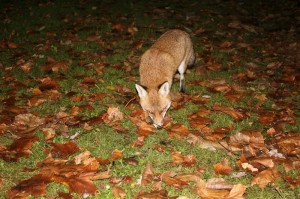It was then that the fox appeared.
“Good morning,” said the fox. […]
“Who are you?” asked the little prince, and added, “You are very pretty to look at.”
“I am a fox,” said the fox.
Come and play with me,” proposed the little prince. “I am so unhappy.”
“I cannot play with you,” the fox said. “I am not tamed.”
Antoine de Saint-Exupéry, The Little Prince

Some of us were still dreaming of an ECLA pet, when, on one October evening, a student encountered in the heart of the campus, a fox. The enthusiasm and surprise spread rapidly, since none of us had ever seen a fox outside the zoo, let alone in a city. All would have sounded like a fantasy, had not it happened again and again in the following weeks. In fact, it turned out that, on our campus, there are at least two foxes.
As time passed, we discovered that there is an entire population around Pankow. Some of us happened to see the red slender miracle crossing the street at the traffic light, others—going into one of the courtyards in the neighborhood. It was officially a phenomenon, and, luckily, we didn’t need a pet anymore.
The encounters were always peaceful. Although some of us felt like being chased by the fox, it was more like a magnetic interaction at a distance, a tango of backward-and-forward motion. To paraphrase A. de Saint-Exupéry again, “[…] no one has tamed us, and we have tamed no one.”
What was clear was that they are far from being our pets. Mr. Fox, as some of us started calling one of them, was the expression of a freedom that we, inhabitants of the big city, seemed to have lost.
Only later I found out that there is a ‘Wild Animal Telephone’ in Berlin and that, usually, people call because they don’t know how to react when they meet the intruders (or, should I say, when they intrude into the natural habitat of the animals?).
According to the recommendations they usually give to people, we were behaving correctly (don’t feed them because this way you don’t help them; stay away. Basically don’t do anything—that is to say, in my interpretation—respect each other’s freedom).
As was to be expected, the phenomenon is not confined to our campus Apparently, foxes have even more ‘extravagant locations’. Commentaries and playful interpretations have sought to respond to people’s concern.
On the 8th of November, the Museum für Naturkunde Berlin opened a thematic exhibition entitled Wildes Biopolis Berlin, in which the curators, among them the photographer Florian Möllers, combined photography, sound installations and informative panels attached to the Haltestelle (bus and tram stations) columns that you see all over Berlin.
Although I did not endorse the curators’ decision to complete the whole setting with stuffed animals (after all, isn’t it about the beasts’ naturalfreedom that we are talking about?), I found the exhibition truly informative and entertaining.
Rather than showing endless enthusiasm, Wildes Biopolis is an attempt to balance different views and issues connected with the so called explosion of biodiversity in Berlin.
For instance, it reminds us of the danger of infestations or of the unfortunate incident in London when a fox entered a house and injured a child, or about the dangers posed by other rodents. But it also stresses Berlin’s successful administration and even augmentation of biodiversity (for instance, the 2005 contest between Berlin Tierpark and New York Central Park, in which the former won).
But, of course, there’s also room for pure, unconcealed enthusiasm, such as in pieces of information like “there are some 50 raccoons in Berlin” or “for each of the three and a half million Berliners there is at least one pair of birds.”
One of the last panels I saw was a table describing the most common habitats in Berlin for some of the species. It turns out that foxes inhabit mostly “private homes.” Crooked as the deduction may be, our campus is like a “private home”. In which our freedom does not hinder their freedom, and vice versa. And thus we live, beautifully untamed.
Aurelia Cojocaru (2nd year BA, Moldova)
